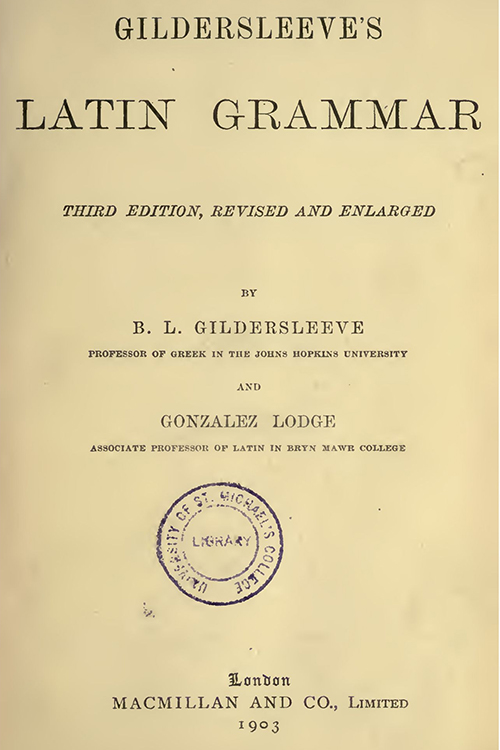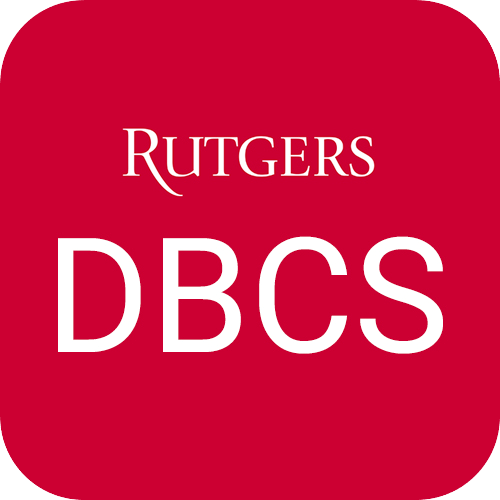| Education | A.B. Johns Hopkins, 1883; Ph.D., 1886; LL.D. Franklin & Marshall, 1901; Litt. D. Columbia U., 1929. |
| Professional experience | Prof. Gk. Davidson, 1886-8; prof. Lat. Bryn Mawr, 1889-1900; prof. Lat. & Gk. Teachers Coll. (Columbia U.), 1900-30; founder & ed.-in-chief CW, 1907-13. |
| Dissertation | "The Participle in Euripides" (Johns Hopkins, 1886); results appear in B. L. Gildersleeve, "On the Stylistic Effect of the Greek Participle," AJP 9 (1888) 149-50. |
| Publications | The Gorgias of Plato (Boston, 1890); Gildersleeve-Lodge Latin Grammar (New York, 1894); mng. ed., Gildersleeve-Lodge Latin series, 16 vols. (New York, 1894-1908); Gildersleeve-Lodge Latin Composition (New York, 1899); Lexicon Plautinum vol. 1 (Leipzig, 1901-24), vol. 2 (1925-33); "Imagination in the Study of the Classics," Educational Review 22 (Sept. 1901) 162-79; Helps for the Teaching of Caesar (New York, 1902); On the Theory of the Ideal Condition in Latin (Baltimore, 1902); "The Teaching of Latin—A Criticism and a Remedy," Nation (30 Aug. 1906) 178-9; "The Vocabulary of High-School Latin," CW 1 (1907-8) 66-9; 74-6; A Vocabulary of High-School Latin (New York, 1907); editorials in CW 1-6 (1907-13); Greek Influence upon Latin Literature (New York, 1912); A Cyclopedia of Education (New York, 1912); "The Revival of Latin," Nation (6 May 1915) 503-4; "Latin in the Junior High School," Sch. & Soc. 1,9 (27 Feb. 1915) 300-4; "The Sham Argument against Latin" Nation (7 June 1917) 689; "Dramatic Interpretation in the Teaching of the Classics," CW 14 (1920-1) 73-7; 81-5; "The Report of the Classical Investigation: Aims and Content of the Four Year Course," CJ 20 (1924-5) 69-85. |
| Notes | As a scholar Gonzalez Lodge produced works which are still in use today: the third edition of the Gildersleeve-Lodge Latin Grammar underwent its 18th reprint in 1976 and his Lexicon Plautinum is indispensable for the student of Plautus. He consistently maintained that broad scholarship enriches the teacher's professional growth. As a teacher of teachers, Lodge advocated the oral method because it involves actively using what is learned and thus offers the best prospect of successfully revitalizing the teaching of Latin. He wanted the classics to be adapted to modern life and made interesting to pupils. Therefore, he urged publishing Latin newspapers, and rewriting modern authors in Latin, putting oneself in the student's place, and choosing readings according to students' interests.As a humanist, Lodge believed firmly that the goal in classics teaching should not be mechanical drill and dead philological facts but the ability to read the ennobling literature of the ancients in the original language. In this way, by appreciating their heritage and developing the life of the spirit, students would become useful members of society and would also enter into the secrets of civilization and of life. Therefore, students must learn to translate at sight and to read as much as possible. Grammatical analysis, slow word-by-word translation, and the use of "ponies," Lodge thought, failed to appeal to and cultivate the spirit. He felt that ancient literature and civilization are particularly valuable for training good taste, shaping character, and understanding the world's history, since they deal with vital issues such as the relationship of the individual to the state, principles of democratic government, duties of a citizen and a statesman, principles of law, respect for freedom, and the ideals of man. Thus Lodge was progressive in the best sense: He wanted to relate schoolwork to life, place language in its context of history and ethnology, put action into the classroom, and make the work important to students. |
| Sources | CW 37 (1943-4) 171-2; Lawrence A. Cremin et al., A History of Teachers College, Columbia University (New York, 1954); Cornelia Meigs, What Makes a College? A History of Bryn Mawr (New York, 1956); NatCAB 31:59; NYTimes (25 Dec. 1942) 25; John F. Ohles, BDAE 806; James Earl Russell, Founding Teachers College (New York, 1937); Teachers College Record (Feb. 1943) 378; M. Carey Thomas Papers at Bryn Mawr, 1895-1906; WhAm 4:582. |
| Author (entry) | Nancy A. Mavrogenes |

 Rutgers Database of Classical Scholars Est. 2018expand_lessThe Rutgers Database of Classical Scholars (DBCS) is a database of classical scholars that is owned and operated by Rutgers University. It is a project within the Department of Classics at the School of Arts and Sciences in New Brunswick, NJ. Started in 2018, the database has over 900 records of scholars as of April 2020. The core set of records comes from a book by Ward W. Briggs, Jr., titled Biographical Dictionary of North American Classicists.
Rutgers Database of Classical Scholars Est. 2018expand_lessThe Rutgers Database of Classical Scholars (DBCS) is a database of classical scholars that is owned and operated by Rutgers University. It is a project within the Department of Classics at the School of Arts and Sciences in New Brunswick, NJ. Started in 2018, the database has over 900 records of scholars as of April 2020. The core set of records comes from a book by Ward W. Briggs, Jr., titled Biographical Dictionary of North American Classicists.





